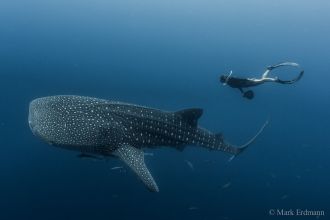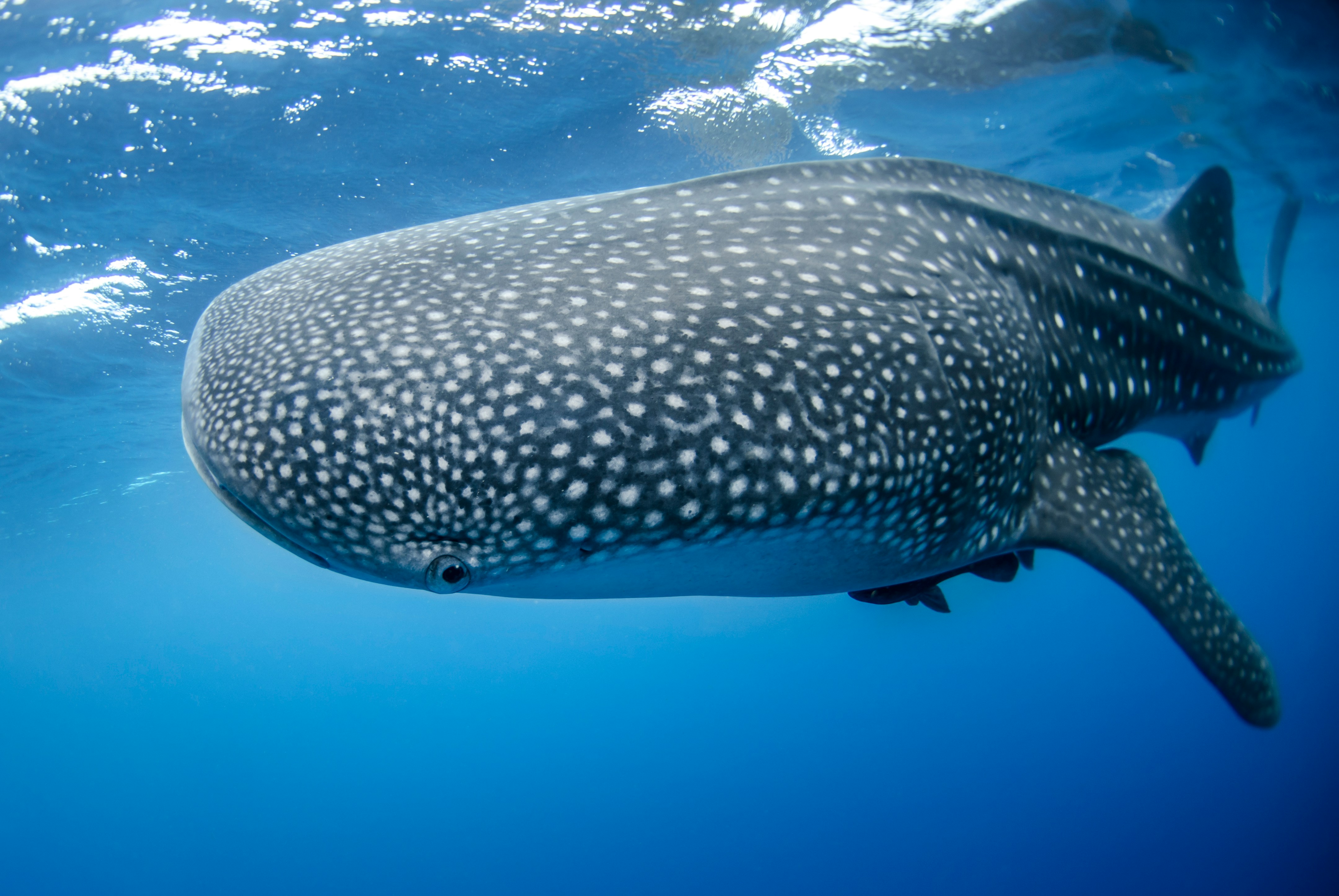Media release
From:
GLOBAL WARMING THREAT TO WHALE SHARKS
An international study has found whale sharks and ships are more likely to collide by the end of the century due to climate change.
The study, published in Nature Climate Change, led by the Marine Biological Association and co-authored by Associate Professor Ana Sequeira and Dr Mark Meekan, from The University of Western Australia’s Oceans Institute, and Dr Luciana Cerqueira Ferreira and Dr Michele Thums from the Australian Institute of Marine Science and adjuncts at UWA’s Oceans Institute.
Researchers used global climate models and satellite-tracking data of 348 tagged whale sharks from 2005 to 2019 and combined it with shipping traffic models and habitat suitability estimates to predict the risk of interaction.
“Whale sharks are highly mobile marine megafauna that can travel hundreds or thousands of kilometres annually,” Associate Professor Sequeira said.
“The species are already vulnerable to collisions with ships due to their use of surface water and the high level of habitat overlap with marine traffic.”
The study found under a high-emissions scenario, whale sharks could be forced to move into cooler environments, and this would make them 15,000 times more likely to collide with ships.
“Moving to cooler regions may protect whale sharks from climate change but we found it can also expose them to risks such as fishing exploitation, increased danger from predators and collisions with ships,” Dr Meekan said.
“This study emphasises the need for quantitative climate-threat predictions in conservation assessments and management of endangered marine megafauna.”
The study concluded whale shark climate-induced migration, and the subsequent hazards, could have population-wide implications.
“Forced climate migration could lead to core habitat loss and reduced foraging opportunities for sharks,” Dr Thums said.
“Unexpected ocean conditions may also lead to increased mortality, and reduced breeding opportunities as where mature adults mate or females give birth is not yet known.”
Expert Reaction
These comments have been collated by the Science Media Centre to provide a variety of expert perspectives on this issue. Feel free to use these quotes in your stories. Views expressed are the personal opinions of the experts named. They do not represent the views of the SMC or any other organisation unless specifically stated.
Mark Erdmann, Conservation International New Zealand, and University of Auckland, comments:
This study was a natural follow-on to a major study our same team released in 2022, where we analysed satellite tracking data from 348 whale sharks (spanning over 15,000 days of tracking their movements) and overlaid it with global shipping track data to show that 92% of whale shark’s movements in the global oceans put them at risk of collision with shipping traffic - and that indeed, we have abundant evidence of ship strikes on whale sharks (which may be an important factor influencing their ongoing population declines around the world).
"In this follow-on study, we wanted to ask the question of how climate change might be predicted to influence changes in whale shark migrations and general habitat use, and if such changes might put them more or less at risk of shipping collisions.
"To do this, we analysed the same satellite tag data set from 348 whale sharks in all global oceans and used the large data set to create habitat models showing where whale sharks are currently most frequently encountered (i.e., where is their current optimal habitat). We then used a number of well-known climate change models to envision how climate change might affect the distribution and migrations of whale sharks.
"As expected, as the oceans warm and productive upwelling areas cease or move, whale sharks are expected to move as well - often with poleward movements (of up to 1000 km) to avoid the warmest of warming waters, though sometimes in unexpected directions as well. These movements mean that some nations that currently have abundant whale shark populations (and significant incomes from whale shark tourism - such as Ningaloo in Australia) may see their sharks move elsewhere - with declines of 50% or more in the occurrence of whale sharks in their national waters.
"We also found that with the modelled changes in distributions and migrations, whale sharks will experience an increase in overlap of their habitats with global shipping lanes - likely further exacerbating the risk of ship strikes/collisions and resulting injury and death.
"Interestingly, the study does not have any particularly relevant discussion to New Zealand, which to me is a shame. We know that whale sharks are actually relatively common offshore of New Zealand (as reported by spotter planes for purse seiners and even the normal flights from Auckland to Aotea Great Barrier Island), but they have never been satellite tagged here and we have a significant dearth of scientific information on whale shark movements and occurrences in Aotearoa’s waters. As such, we are a “black hole” on the whale shark map - something that we hope can be rectified sometime in the near future!
Multimedia










 Australia; New Zealand; International
Australia; New Zealand; International


